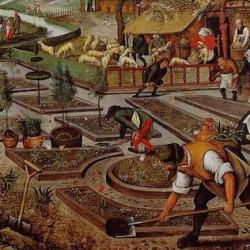Scarcity is one of the central premises of economic theory. John Milbank and Adrian Pabst see the premise of scarcity as one of a triad of pessimistic assumptions that found liberal order – the other two are “ontological violence and natural egoism” (Politics of Virtue, 48). They don’t accept any of them, including the premise of scarcity.
Scarcity is “nearly always something artificially engineered by monopolisation or global trade in order to increase returns on capital.” They point out that “Nature is naturally abundant and inexhaustible, if treated with ecological care” and argue that “a social reality and psychological fantasy of ‘scarcity’ must be instilled by capitalism if competitive is to be seen as a basic necessity, rather than being rightly regarded, in more tempered fashion, as often a stimulus to greater excellent, with ensuing social benefit.”
Several thoughts. They’re right that nature is abundant. Plant a grain and you get a stalk of wheat with hundreds of grains. Plant a seed and you get an apple tree that produces for decades. Mother earth gives good returns. Their conspiratorial account of capitalist manufacture of scarcity isn’t convincing, and leaves out a critical factor (surprisingly for two theologians): God’s judgment. The world is abundant, but it is entirely dependent on the God who gives increase. And God can turn the sky above to bronze and the earth below to iron. Not all scarcity is manufactured by greedy capitalists or monopolies.
Milbank and Pabst mount a brief critique of Girard when they say that “the psychological fantasy of scarcity . . . supposes a sheerly natural contagion of mimetic desire, in denial of any hierarchy of values or any sense that the most valuable things—such as sunshine and friendship—are not in short supply” (48). In a footnote, they name Girard and add, “Girard describes superbly the pathology of mimetic desiring, but in a newly Rousseauian fashion naturalises this condition without warrant or evidence” (66, fn 107). Mimetic competition, in other words, holds true in a world that has denied that goods have inherent value, where all value is attributed by competing human beings. Girard universalizes what is in fact a theory of liberal desire. Much as I appreciate Girard, I think that’s a critique worth pondering.















